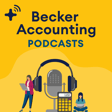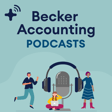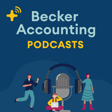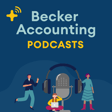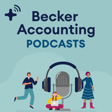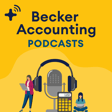
Cool Careers in Accounting Ep. 4 - Building a Career from CPA to Finance VP with Tory Bauman
Tory Bauman is a CPA and VP of Finance at Zayo, an international fiber optic networking company. Listen to her refreshingly honest perspective about growing her career from a Big 4 firm through a finance position, starting her own firm, and eventually coming back to finance. Learn from her story showcasing the breadth of what is possible with a background in accounting.
Earn CPE by listening to this podcast through a Becker Prime CPE subscription.
Listen to this episode through your Becker LMS platform to complete practice questions, pass the final exam, and earn CPE credit.
Already a Becker Prime CPE customer? Login here.
Have access to Becker CPE through your employer? Earn CPE credit for this podcast however you consume Becker CPE, either through your company’s LMS or via the Becker platform. Not sure where to log in? Check with your CPE admin.
Learn more about CPE Podcasts from Becker: https://www.becker.com/cpe/becker-podcasts
